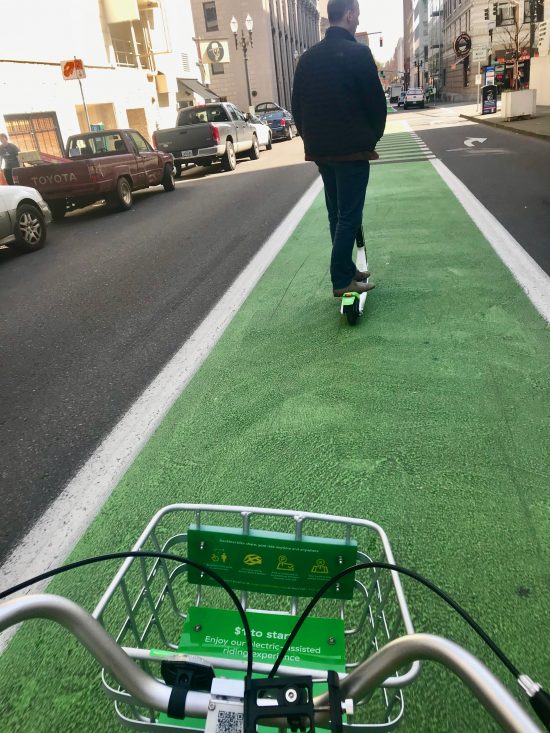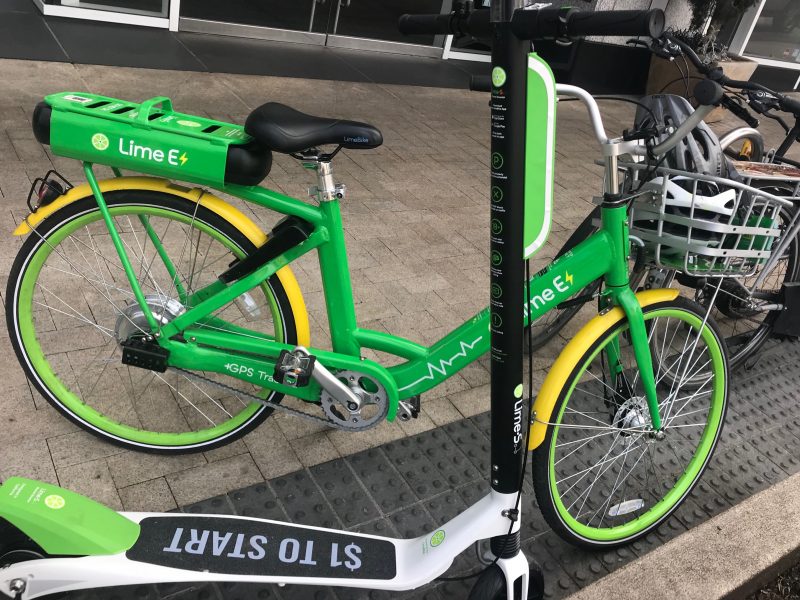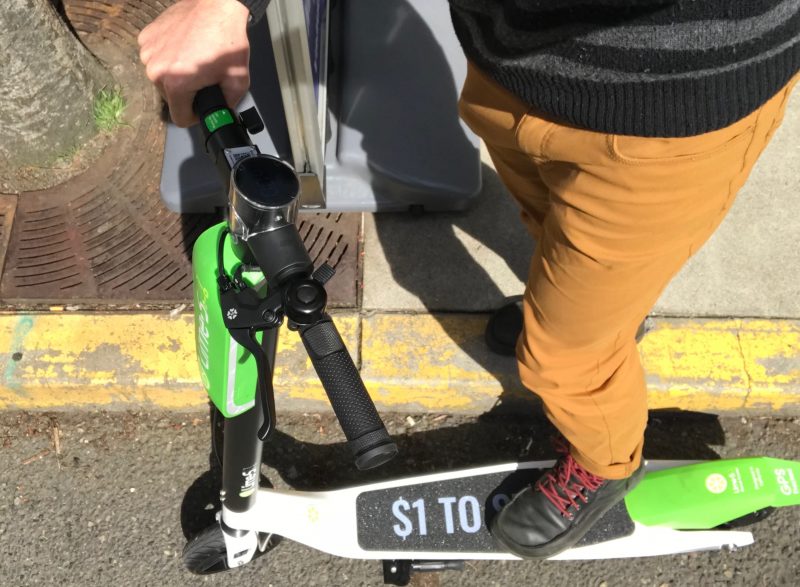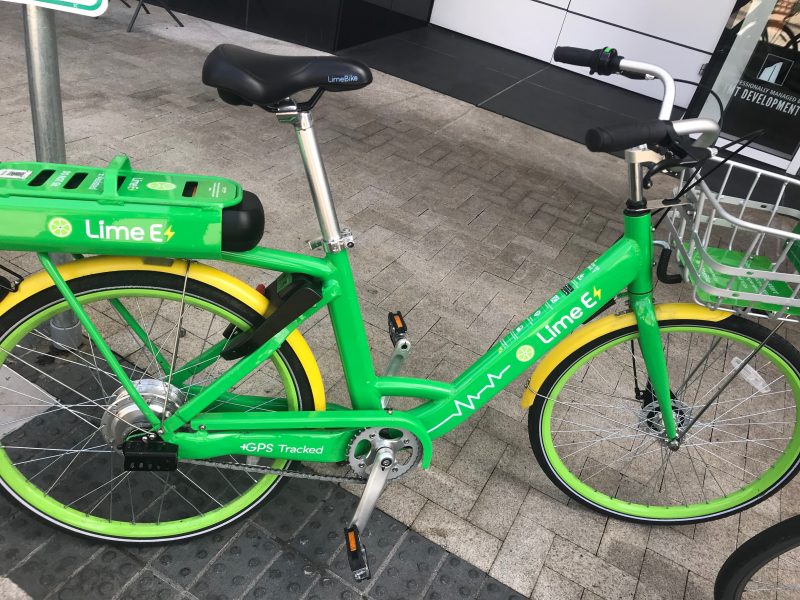
(Photos: J. Maus/BikePortland)
Here’s my predication: It’s not a matter of if Portland will get dockless bikes, it’s a matter of when.
On Monday we revealed dockless bike share start-up LimeBike is hiring a full-time staff person to manage their fleet in Portland. In response to that story the City of Portland confirmed with us they’ve been in contact several bike dockless bike share providers. Bureau of Transportation spokesperson Dylan Rivera shared via email, “We are developing a timeframe and process for the permits needed to provide private bike share service.” This acknowledgment follows a field trip to Seattle earlier this year where PBOT bike share staff tested dockless systems.
Just yesterday, LimeBike Chief Program Officer Scott Kubly (a former director of the Seattle Department of Transportation and former colleague of PBOT Director Leah Treat) and LimeBike’s Portland-based Regional General Manager Jason Wilde were in town. They had one of their electric-assist bikes and an electric scooter along with them. I met them briefly downtown to learn more about the company and get a chance to test ride both products.

The first thing I grabbed was the scooter. Dockless, e-scooters have already hit the streets of San Francisco and a few other cities. They’re attractive to operators because they’re cheaper and easier to deploy — and more importantly — most cities don’t have any specific regulations that prohibit them (although San Francisco is talking tough).
The scooters would work just like the bikes. With the app on your phone you walk up to the scooter you want, scan the code, wait for the beep, and off you go. It’s $1 unlock and just 15 cents per minute once you get going.
I loved riding the scooter! My only reference were the scooters my kids have used over the years, so the first thing I noticed was how beefy it was. The stanchion that holds the bar, the platform to stand on, and the wheels themselves felt plenty stout (and I’m 6-foot 2-inches and about 175 pounds). There was a hand-brake on the left and a little throttle for my thumb on the right. All I had to do to get going was to push-forward gently with my leg.
The feeling was like a hybrid of biking and walking. I felt unencumbered by a large mechanism of metal tubes, yet I was in the road with other vehicles (riding on sidewalks downtown is illegal). Hitting large bumps and crossing light rail gaps was a bit unnerving at first; but fine once I got used to it. I liked how nimble the scooter felt, and how easy I could transition between being a vehicle in the road with car users, and then morph into more of a walker when I wanted to. I rolled over to the carfree Ankeny Alley and was able to ride it at walking speed in a crowded environment without people jumping out of the way or giving me the stink-eye.
Top speed was 15 mph (maximum allowed under Oregon law), which is all you need downtown (signals are set for 12 mph), until you get a jerk behind you who think you’re using a toy — but that’s something I’m used to as someone who rides a bike traffic all the time. Speaking of which, for people not used to biking in traffic, these scooters will take some getting used to. I would suspect a bit of a learning curve and a few tumbles for sure. One thing I don’t like about the scooter is I couldn’t signal my turns because I didn’t feel comfortable enough to take a hand off the bars. That’s really dangerous in a crowded street environment. They really need blinkers. (Or I suppose I could have tried kicking one leg out either side.)
Once I got the hang of it, I was comfortable weaving around busy downtown Portland traffic. And it was really fun and easy!
Advertisement
Overall I’m very intrigued about the potential these scooters have for being an affordable, efficient, and safe way to get around. You probably wouldn’t commute or ride a few miles with these. The scooters would be perfect for moving within neighborhoods and commercial districts, or as a last-few-blocks solution from your transit stop to your destination.
And yes, electric scooters are allowed in bike lanes and paths in Oregon. However, according to this handy guide from the Oregon DMV, you cannot ride them in crosswalks. And unlike with bicycles, adults are required by law to wear helmets while using an electric scooter.
I also rode LimeBike’s “Lime-E” electric bike. It’s a basic city bike with everything you need including a bell, lights, and a basket. The first thing I noticed when I got on is that you don’t have to shift. Just start pedaling and the motor kicks in, with the gears changing automatically as you ride. The torque is much stronger at slow speeds, which was nice for jumping from a stop. But that meant I felt less power as I pedaled more. Overall it seemed like a fine bike. It’s not as stout or tight as our wonderful Biketown bikes (doesn’t look as cool either in my opinion), and I’d have to spend more time on it to really give it a full review.
E-bikes could really take a big bite out of Biketown. It’s so nice to have a free boost of power that can make hills a breeze and give someone an extra dose of confidence and power when they need it. For many people, having access to an affordable e-bike could be that game-changing factor that allows them to give cycling a try (and ultimately stop driving so much).
As for when we might see dockless e-bikes and e-scooters in Portland. Officially, everyone’s tight-lipped. But my personal hunch is that once PBOT finds a regulatory/political situation they’re comfortable with, they’ll put out a public invite to dockless vendors. Then they could host some sort of pop-up demonstration (like at Sunday Parkways for instance) and/or a pilot project to see how it goes.
The trouble is, dockless only works when a sufficiently sized area is saturated with bikes (Seattle has 10 times as many bike share bikes on their streets as we do). A limited trial might not demonstrate their true potential, but on the flipside, if too many hit the street and the parking clutter hysteria takes root, PBOT might get cold feet.
Hopefully we figure out a way to try this that gives this new technology a fair shake, without over-regulating it to death.
PBOT was famously slow to get a bike share system. It took us nine years to get from planning to signing a deal with Nike. They can’t do that with dockless. Things are moving fast and if Portland wants to reap the immense benefits of highly accessible, inexpensive, healthy competitor to private car use — the City needs to make this happen sooner rather than later.
And as host city of the just-announced North American Bike Share Association/Better Bike Share Partnership annual conference, Portland won’t want to look outdated.
Stay tuned.
— Jonathan Maus: (503) 706-8804, @jonathan_maus on Twitter and jonathan@bikeportland.org
Never miss a story. Sign-up for the daily BP Headlines email.
BikePortland needs your support.



